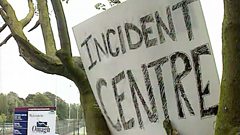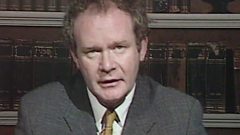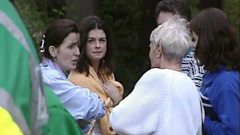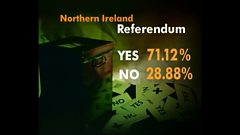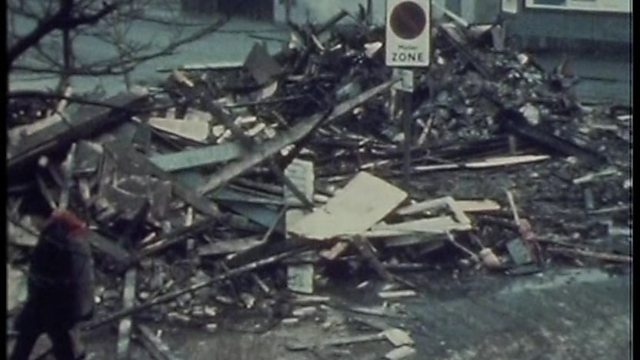
Fifteen people are killed by a loyalist bomb explosion at McGurk's Bar.
A bomb planted by the loyalist Ulster Volunteer Force at McGurk's Bar in the New Lodge district of belfast, kills fifteen people and injures seventeen.
McGurk’s Bar, also known as the Tramore Bar, was a two-storey public house on the corner of North Queen Street and Great George’s Street in Belfast. Located north of the city centre, the bar was on the fringe of the Catholic and nationalist New Lodge area, where most of its customers came from.
At 8:45 pm, a young boy, eight year old Joseph McClory, was delivering the Ireland's Saturday Night newspaper. He saw a man get out of a car which had a tiny Union Jack in the rear window and leave a bomb in the hallway of the pub. The bomb exploded, killing fifteen people and injuring seventeen. News reports suggested that the explosion had been caused by an IRA bomb that had been detonated by accident in the bar, a suggestion that was refuted by the relatives of the victims. In 1978, a member of the loyalist Ulster Volunteer Force received fifteen life sentences for his role in the attack.
Within hours of the bomb explosion, rival crowds gathered in the area and began rioting. The IRA opened fire and hit Major Jeremy Snow who died from his wounds four days later.
The bar owner Patrick McGurk lost his wife, Philomena, and his 14-year-old daughter, Maria. The other victims included another child, two women and two pensioners. Hours after the attack, Patrick McGurk, who like his three sons was seriously injured, appeared on television and called for no retaliation: "It doesn't matter who planted the bomb. What's done can't be undone," he said. "I've been trying to keep bitterness out of it."
CONTEXT
Not all of the violence of the early 1970s in Northern Ireland was the work of the Provisional IRA although more than sixty people were killed by PIRA from August through to November 1971. In the three days following internment on 9 August 1971, twenty-five people were killed mainly by the Army. As PIRA increased its attacks, working-class loyalists established the Ulster Defence Association, a loose alliance of loyalist vigilante groups and paramilitaries. The long-established Ulster Volunteer Force (UVF) was also active.
The Army, the police and the Ulster Defence Regiment appeared incapable of halting the IRA onslaught. A bomb at the Four Step Inn in the loyalist heartland of the Shankill Road in September killed two people and injured twenty and was condemned by the Northern Ireland Civil Rights Association and John Hume of the SDLP. NICRA and Hume said the bombing of the pub was a deliberate attempt to stir up sectarian hatred.
The UVF, a loyalist paramilitary organisation, bombed McGurk’s Bar in North Queen Street in North Belfast on 4 December killing fifteen people.
The media reported the Army’s view that the bomb was the result of a Provisional IRA “own goal” and the Security Minister, John Taylor, told the Stormont parliament four days later that “forensic evidence supports the theory that the explosion… took place inside the building”. The nationalist community always disputed this version of events and were proved right seven years later when a UVF man received 15 life sentences for the bomb attack. The false claims, combined with the lack of a thorough investigation, further alienated the nationalist community from the Stormont government and the security forces.
More people died in this single explosion than any previous one, making it the most horrific incident of the conflict to date. The Provisional IRA responded a week later by blowing up a furniture store on the Shankill Road, killing four people, two of them children.
Duration:
This clip is from
More clips from ������̳ Weekend News
-
![]()
Omagh bomb victims in hospital—16/08/1998
Duration: 02:48
-
![]()
Political reaction to Omagh bomb—16/08/1998
Duration: 02:17
-
![]()
Omagh bomb—15/08/1998
Duration: 03:04
-
![]()
Northern Ireland votes yes to Good Friday Agreement—23/05/1998
Duration: 04:31

